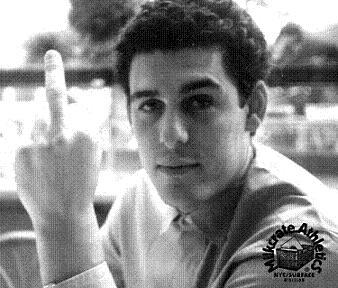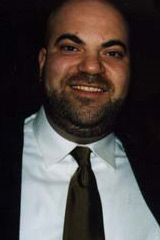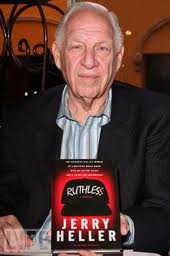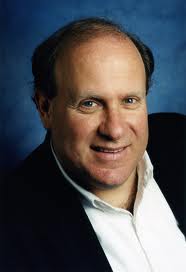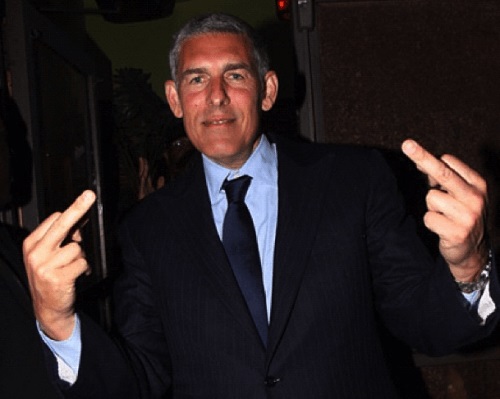All About the Benjamins
By Matthew Cowan
Heeb Magazine,
04·Issue 4, Oct 1,
2003
About two years ago, Jonathan Wolfson,
a self-described neurotic Jew from Rockland County, New York entered
Mule Creek State Prison in Ione, Calif., forty-five minutes outside
Sacramento. It was Wolfson’s first time in any penitentiary, let
alone a Level 4 maximum-security penitentiary. The 30-year-old
publicist was there to pitch a client. Wolfson sat in a visiting
room as the imposing figure of Suge Knight, the controversial CEO of
Tha Row Records (formerly Death Row), came out to sit in front of
him. “Basically,” Wolfson recalls, “I said that Tha Row hadn’t had
anyone handling their PR in a long time, and that there was going to
be a media frenzy upon Suge’s release. I threw some numbers at him,
and we talked about working together.” Within the first few minutes
of their meeting, Knight asked Wolfson about his background. “I told
him I’m Jewish,” Wolfson says. “He chuckled and said, “Yeah, me
too.” I joked, “Yeah, you look it.” He said, “Seriously, I have a
lot of respect for Jews. They came to this country with nothing,
they lived in their own communities and had their businesses and
supported each other and built themselves up.” He wanted me to know
he had respect.” Since then, whatever one thinks of Knight's
motives, he and Wolfson’s work together at Tha Row has been what
Wolfson describes as “a roller coaster,” but they get along well,
and have a productive, personable relationship.
Considering Jews in hip-hop is kind of like finding a stoop sale
with a couple of interesting eye-catchers on the sidewalk, and a
trove of far more significant treasures further up the stairs. The
eye-catchers are the usual suspects-- the Beastie Boys, Remedy of
the Wu-Tang Clan, Blood of Abraham, Paul Barman-- MCs whose skills
vary and whose Jewishness defies the hip-hop norm. But, their
presence on wax is nothing compared to what goes on behind the
scenes. Indeed, some of the biggest names in
the business are Jewish-- Lyor Cohen of Def Jam,
Steve Rifkind of
Loud Records, David Mays of The Source-- to say nothing of those who
course throughout the industry as label executives, entertainment
lawyers, agents, publicists, producers, clothiers, and jewelers. An
inquiry to one inevitably references five more: “Oh, have you talked
to Gottleib at FUBU? Or Sonenberg who handles Wyclef?” The Jewish
presence in hip-hop is huge, and, for the most part, offstage.
From block parties to the height of pop culture, hip-hop’s 20-year
ascension has been remarkable for its speed, adaptability, and broad
appeal. It has exploded into a global phenomenon with enormous
social implications and an economic tsunami with infinite marketing
possibilities. Likewise, the cultural input into hip-hop has become
dizzying. Japanese kids with perfectly coiffed dreadlocks breakdance
to lyrics they don’t understand. Jay-Z raps for peace over a Punjabi
beat. Jamie Kennedy gets such shine from portraying a corny rapper
named Gluckman that he finds himself at nightclubs with real rappers
named Li’l Kim and Fabolous. Kids from all backgrounds feel the film
Ï8 Mile-- the money shot of which has a white kid defeating a black
kid in a battle by outing him for his bourgie-ness. In this climate,
it makes sense that Jews are up in the mix, with a role that can
perhaps only be discussed, not decoded.
Paul Rosenberg is a giant in the
industry. Both figuratively-- he’s Eminem’s manager, president of
Goliath Records, and vice president of Shady Records, to which both
Eminem and 50 Cent are signed-- and literally: he’s 6 feet 5 inches
tall, and 300 pounds. Like Eminem, Rosenberg is from the Detroit
area, although from the suburbs rather than the city. “People
weren’t checking for hip-hop back then in the suburbs like they are
now,” he says. During his senior year of high school and freshman
year of college, Rosenberg began rapping, going by the name MC Paul
Bunyan in a group called Rhythm Cartel that played Detroit’s few
hip-hop venues. After a couple years of moving back and forth
between the classroom and the stage, he chose to go to law school
rather than pursue a career as a rapper. When asked why, he jokes
that being Jewish, he had to. He quickly rescinds the joke, and
speaks in earnest about his educational goals. I’m struck by his
change in career path and the implications that came from it.
Rosenberg was-- and is-- extremely passionate about hip-hop, and he
certainly had the desire to be a rapper. But he somehow ended up a
contributor to the music’s framework more than the music itself.
The very idea of the machinations of Jews behind the scenes is a
topic of historical controversy and itinerant conspiracy theories.
There is a well-documented legacy-- painful on both sides-- of
Jewish involvement in black music. From the early days of jazz and
blues through rock and roll until now, there have been accusations
of Jewish executives like Morris Levy
and Herman Lubinsky exploiting black
talent. In an upcoming documentary produced by Martin Scorsese and
directed by Marc Levin,
Alfred Chess passionately defends his
father and uncle from such charges. The history of black performers
being denied musical credit and proper financial remuneration is an
injustice in itself, as well as a reminder of so many other facets
of racism. Hip-hop is a different game though. To posit that its
contractual dynamics are the same as its musical predecessors is to
deny the savvy of black artists and executives; to underestimate the
real musical passion of Jews in the industry; and to ignore some of
the most egregious examples of abuse (no one, for example, has ever
accused a Jew of hanging a rapper out the window by his ankles until
he signed over his publishing rights). It is to neglect the changing
social climate, the real melting pot that has led more young whites,
Jewish and not, to know black people not as an unfamiliar ‘other,’
but just as the peers with whom they grew up. And most importantly,
it denies that the music industry is intrinsically set up to exploit
artists, regardless of who they are.
Amid the paraphernalia in entertainment lawyer Michael Selverne’s impressive corner office, are two huge
photos taken by his wife of an old Jewish couple, opposite a
blown-up Rolling Stone cover autographed by the Fugees, (“Mike, keep
making us that money”). Selverne argues that animosity between
artists and labels is structural rather than ethnic. “The basic
model used by all record companies creates a misalignment of
interests,” he explains. “In our industry, the label invests money,
and once that money is repaid, the label continues to own the
product, the business, the rights, the right to control the trade
name and brand, etc. This is true in artist’s agreements, joint
ventures, and label deals. It’s part of why they don’t work. The
brand is serving two masters, whose economic agendas are not the
same. This misalignment of interests promotes the dysfunctional,
often adversarial nature of artist-label relations.” Or, as Q-Tip
put it succinctly in the song, “Check The Rhime”: Industry rule
4,080/Record company people are shady.”
Selverne argues for smaller labels that take more time to cultivate
artists and move away from the hit single-driven paradigm that makes
today’s rap stars so disposable. Tru Criminal Records is such a
label. It was started in the early 90s by Lee
Resnick, a 29-year-old Jewish kid from Long Island. Like
Paul Rosenberg, Resnick-- known in the industry as Skill-- started
out as a rapper. At 17, he got a deal with Geffen from which he was
quickly dropped. “I wasn’t good enough,” he says. “But I knew that I
could tell what was.” After college, he ran through a couple of
internships and had a very Jewish revelation: that he didn’t want to
work for anyone else. He took $5,000 of his bar mitzvah savings, his
partner did the same, and they started Tru Criminal. The label
matched up new artists in whom Resnick saw potential with
established producers, and a few of their early records made some
noise, including “Heavy Metal Things” featuring Pharoah Monche.
Resnick rolled all the profits back into the company and lived at
home to save money. “All my friends moved to the city, were getting
laid, and I couldn’t even take a girl home because I was living with
my parents,” he says. Now the tables have turned. “I own my place in
Manhattan. I’m more financially stable than most of them. And best
of all, I don’t have to wear a suit.”
When I met Skill, he most definitely wasn’t wearing a suit. He told
me I’d recognize him because he looks “like MC Serch without
glasses.” His is the paradigmatic aesthetic of the young Jew in
hip-hop-- the oversized sports wear, the close-cropped hair shaved
to a suede-like terrain, a modified pimp roll, and an easy way with
slang. The term ‘suedehead’ to describe this aesthetic was
introduced to me by Larry Zimmer,
president of the Johnny Blaze clothing line, when I ran into Skill
in Zimmer’s office a couple days after we’d met. Zimmer is a Jewish
hip-hop icon of another type. In his fifties with longish hair and
an open collar, he chain smokes Bel-Airs and is more likely to dip
into Yiddish than street slang. Like other
Jews who produce hip-hop fashion at companies like FUBU, Phat Farm,
and Lugz, Zimmer and his ilk are basically old-time schmatte
salesmen who now deal in baggy jeans and retro-sports jerseys.
He sees his work as part of a cultural tradition. “Jews have always
been in the garment business,” he declares. “I think if you go back
to our European origins, we all had to have a trade, and Jews had a
flair for clothes.” When Zimmer started Johnny Blaze in 1997, he was
more into Bob Seger and Chicago than Wu-Tang and Lauryn Hill, but
like all good businessmen, he had his ear to the ground (or, in this
case, BET). “I was in young menswear, and whether I liked the music
or not, I saw that this is where the business was going.” Since
then, Zimmer says he has come to enjoy and embrace the music. He
especially likes DMX and P-Diddy, and can talk about what styles the
kids are going to ‘feel’ with surprising authority.
Indeed, it is the business of the fashion world to know how trends
unfold, and it is acknowledged that embracing urban youth is the
best way to market to kids worldwide. Larry
Schwartz is the CEO of Lugz, a company that has cooled
off since its heyday in the 90s, but was then near-ubiquitous in the
hip-hop world, having been endorsed by such rap icons as Funkmaster
Flex, Rakim, Snoop and EPMD. Schwartz’ grandfather had a shoe
business on Duane Street in lower Manhattan. On the wall of
Schwartz’ SoHo office hangs the old sign that adorned his
grandfather’s store, and on his desk sits a signed picture of
KRS-ONE (“To Larry, you are hip-hop”). Schwartz marries a concern
for the issues facing urban youth with a near-scientific
understanding of fashions” paths. “A new trend starts with a group
of kids in New York, goes down to Philly, Baltimore and DC,” he says
confidently. “Once it gets to Atlanta, it’ll go throughout the
South, and at the same time jump across to Chicago and to Oakland
and then San Francisco. While the trend moves down the coast, it
will also go down the I-80 corridor. And then of course, to Tokyo,
Paris, Dusseldorf, and so forth.”
There is an obvious difference between guys like Zimmer and
Schwartz, who are businessmen embracing a market, and guys like
Rosenberg and Skill, who have been personally immersed in hip-hop
culture for most of their lives. But they all have an optimistic
view of intercultural relations as it pertains to their work.
Zimmer gushes about what he sees uniting
them. "Jews, Italians and blacks were the only ones to step up [to
the hip-hop market]," he says. “The WASPs were sailing with Biffy on
Sundays-- they don’t give a shit about us. We’re passionate
people. We’ll grab a brother, grab a good friend, hug him and kiss
him. If you’re a passionate person, you work best around other
passionate people.”
Schwartz is more circumspect about his relationship with the hip-hop
community. For him, it’s more about respect than commonality.
Sensitivity towards the culture to which he markets is both a moral
choice and a marketing decision. “We’ve been fair and honest in our
dealings and respectful of the culture,” he says. “That’s how we’d
do it anyway, but since it’s a culture that’s not our own, we go the
extra mile to understand it. When you make mistakes, you show you’re
not down.”
Rosenberg and Skill, with their rapping backgrounds and easy
socialization with hip-hop heads of all colors, are more reflexive
with their race- and religion-blindness. “I think one of the great
things about rap music right now is that there’s just not much
stigma attached to race and religion,” Rosenberg says. He had just
gotten back from a tour in Japan with Eminem and Xhibit. Asked if
issues of culture and ethnicity ever came up in the course of their
travels, his laugh and prompt dismissal of the question indicated
just how far off that idea was from the reality of what happens
backstage. Skill, likewise, senses no conflict between his
Jewishness and his career. He speaks with great pride and concern
about his artists, and with passion about the connection between
them. “We’re all from different backgrounds, we all grew up
completely differently,” he says. “But we all have the same belief
in each other. That’s what’s important.”
I believe Zimmer and Schwartz when they say they respect the people
who comprise their market, and I believe Skill and Rosenberg when
they talk about the egalitarianism they experience in hip-hop. But I
also know that the philosophy espoused during an interview can
differ from how things go down in actuality. With Skill’s
permission, I attended a recording session at which a Tru Criminal
artist named Fuc That recorded a new track over a lush Just Blaze
beat. For all the glamour and dynamism of the music industry,
actually watching a song come together can be excruciatingly boring.
For five hours, FT (as he’s called) lay down the first of three
verses over the track. Just off the Anger Management Tour with
Eminem and Ludacris, FT is poised to blow up. He came to Tru
Criminal through a friend of Skill’s, and his lyrical talent and
endearing personality have brought him quickly into the fold. By the
time I interviewed him, he had been rhyming and chain-smoking blunts
for hours. It was apparent that he thought our conversation would be
standard hip-hop journalist fare-- “How do you get inspiration for
your lyrics? Do you have beef with anyone else in the industry?”--
and seemed taken aback by questions about the Jewish head of his
label. At one point, he looked at his friend like, the fuck is
this?” I asked about Skill’s contention that everyone at Tru
Criminal was in the game together. He acknowledged that they are in
it together, that they’re close, and that their financial fortunes
co-mingle. But he was guarded as well. “I don’t know about us all
having each other’s back,” he said. “When the big business decisions
come down, I turn to my family, my mom and my pops.”
Innocent stuff. In this media-saturated era, celebrities and
aspiring celebrities won’t say much that’s controversial, and few
straight up dis their current management on the record. But my take
on FT’s hesitance didn’t fully support the utopian ideal that Skill
espouses. Again, exploitation is a tempting word to use when the
product of a small group of kids (mostly black) make so many
ancillary people (mostly white, many Jewish) so much money. But in
this instance, it’s important to complexify the term. Most hip-hop
tells the stories of people in the shadows of American life, told by
the people who live there. If we think it’s important that the
stories of people facing poverty and discrimination are told; and if
we think it’s best that these stories come from the people actually
experiencing that life, rather than the Kozols and Kotlowitzes of
the world; and if we take hip-hop seriously; then Skill, by creating
a channel for the words of kids he scouts in the projects and the
friends of friends out there, would seem to be doing profoundly
progressive work. The verse FT kicked over and over in the studio
that day engraved itself in my brain: I ain’t in this biz for
nothing/Niggas pushing Cadillacs while my ribs is touching/How I got
time for a big discussion when I’m hungry and my kids are
fussing/But you don’t hear me though. For better or worse, this is a
radical statement, and a Jewish kid from Long Island is paving the
way for people to hear it.
Hip-hop is a game so much about money that it’s tempting to boil the
whole topic down to one sentence: Everybody wants to get paid. But I
like to think it’s about more than that. In many ways, it
crystallizes two of American cultures” most interesting strains. The
first is that of the outlaw-- the tradition of plowing a renegade
path to power when the conventional paths are prohibited. My
thoughts about hip-hop as an outlaw form were echoed by
Marc Levin. Levin, the director of
Slam, Whiteboyz and Brooklyn Babylon, is a middle-aged, middle-class
Jewish guy who has made some of the most honest and searching films
about hip-hop. “Gangster culture is about being an outsider,” Levin
says. His cluttered office is filled with placards bearing the names
of actors who will be appearing in upcoming episodes of the show he
produces, “Street Time,” a cop drama on Showtime. One scrawled pair
of index cards announces the unlikely pairing of Judd Hirsch with
Fat Joe. “You have a white Protestant
culture, and you have the immigrants,” he continues. “The
entertainment world was seen as somehow below what respectable
people would do, so it opened up to the outsiders. Being gangsters
was outside. Gangster capitalism was how
many Jewish businesses started, Italian businesses started, black
businesses started. These guys ran the whorehouses and the dives,
the jazz clubs, and the speakeasies. There has always been an
intersection between the creative and entertaining, and the muscle,
the mob and crime, because they were both outside what was
considered legitimate. Jews were part of it, a big part. Look
at Arnold Rothstein,” he says, referring to the iconic gambler and
gangster who allegedly fixed the 1919 World Series. “Lucky Luciano
and Meyer Lansky were students of Rothstein’s.” This gangster
aesthetic is all over rap music-- a whole subsection of the music is
called ‘gangsta,’ of course, and artists name themselves after
Capone, Gotti, Murder Inc. and Meyer Lansky.
The drive to succeed in spite of the mainstream’s barriers is no
longer as relevant to Jews now that, generations into our American
experience, we enjoy unfettered access to virtually all the hallways
of power. But it is still in our system, and it still
connects us to a world that celebrates the triumph of the outlaw-- a
world where determination, ruthlessness, and boundless energy have a
fighting chance against the barriers put up to keep outsiders out.
The other metaphorical space in which hip-hop resides is the
utopian. Although the kind of activism espoused by the civil rights
movement has been mostly marginalized, there are certain parts of
hip-hop culture that address the same combination of black
empowerment, cultural harmony, and progressive politics that
informed that movement. Multi-faceted urban mogul Russell Simmons
and Rabbi Mark Schneier are the
cornerstones of the Foundation for Ethnic Understanding, a group
that aims to bring blacks and Jews together to lobby for mutually
beneficial political goals. In the Upper East Side brownstone from
which the foundation runs, the smooth-talking, immaculately dressed
Schneier emphasizes the utopian goals of the organization, which has
honored Jay-Z, Lyor Cohen, P-Diddy, Steve Resnick, and Damon Dash
among others. “We’re a voice of conscience,” he says. “Blacks and
Jews need to take a step back and acknowledge that we have this
genuine relationship, and remind ourselves that
it was the alliance of blacks and Jews that
brought about the greatest social change in the history of this
country. When you see someone like Russell Simmons or P-Diddy
or Jay-Z putting their stamp on this cause, that will disseminate,
that will trickle down to young people. We have to recognize the
strength of our similarities. We’re minorities, we have shared
concerns-- discrimination, hate crimes, foreign aid.” Simmons echoes
Schneier: “A lot of my business partners have been Jewish,” he says.
“As far as relationships in the industry go, I think we’re past any
discrimination. The alliance between blacks and Jews is a natural
one.
In many corners of the hip-hop world, the visions extend far beyond
alliances between blacks and Jews. Identity and ‘realness’ are such
currency in this community that, at its best, people are forced to
fully embrace who they really are and where they come from and are
then invited to join in on a world that embraces rebellion against
authority, progressive politics, ecstatic multiculturalism and
transgressive humor. Hip-hop is now the only subculture in which
people say ‘peace’ to one another without irony. At its inclusive
best, hip-hop is today’s bohemia, where creativity and spontaneity
are supremely celebrated. Like jazz and rock and roll before it,
hip-hop can be a retreat into meritocratic ideals backed by a nice
beat. The culture of hip-hop is exciting mostly because it’s still
flush with possibility.
About a year after Jonathan Wolfson pitched his PR services to Suge
Knight, a young, black hip-hop producer named Eddie Bezalel was
riding shotgun in a Jeep making its way through Lower Manhattan.
Driving the car was a colleague of Bezalel’s, an entrepreneurial
hip-hop veteran-- let’s call him IQ-- another young black man, and
he was angry. IQ was venting to Bezalel about an older, white
executive they both knew. “That dude is mad shysty,” IQ fumed. “He’s
Jewish, man. He’s definitely Jewish.” This rant would seem to be
evidence of the rancor felt towards Jewish guys in the business, but
the conversation took a quick and unexpected turn: “Look, are we
cool?” Bezalel asked IQ. “Yeah, we’re cool,” IQ responded. “Well let
me tell you something,” continued Bezalel, the son of Ethiopian
Orthodox Jews and a proud graduate of Westchester Hebrew High
School. “That dude is shysty, but he’s not Jewish. I’m Jewish.” As a
black Jew in the music business, Bezalel is in a rarefied position
to weigh in on this particular intersection of ethnicity, culture
and commerce. As he recounted this story to me, it was clear he
didn’t believe IQ harbored genuinely anti-Semitic feelings, but was
rather employing a kind of unfortunate ethnic shorthand that comes
to many in moments of anger. “People in the industry have all kinds
of perceptions,” Bezalel summarizes. “But in the end, what really
matters is that you bring music that’s really hot.”
Jews Control Hip-Hop




























